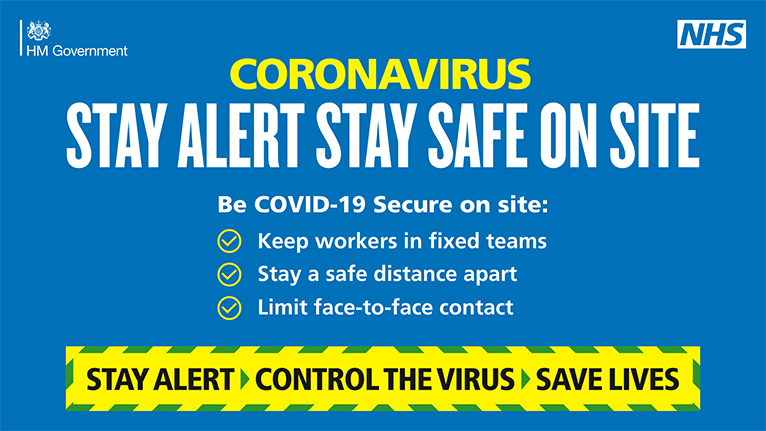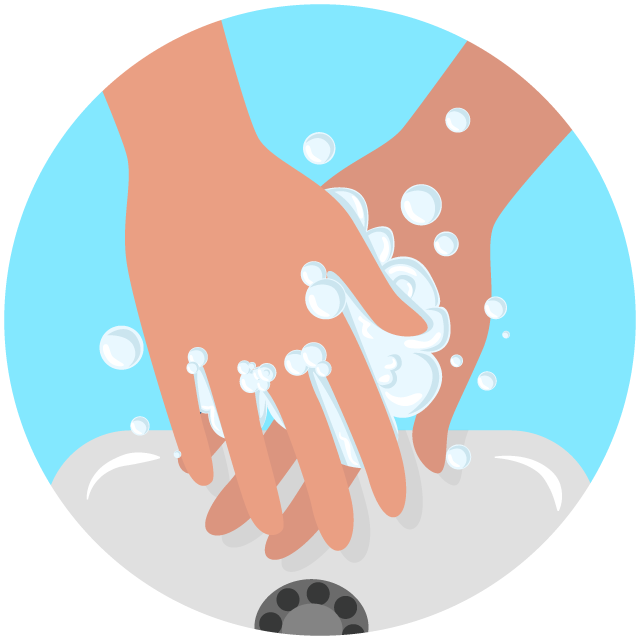Last updated: 4th August 2021
- For FAQ’s about coronavirus and using Rated People, head to our FAQs.
- For information on government support for trade businesses, head to our Trade Advice Centre.
It’s important that we all follow the government guidelines on reducing the spread of COVID-19, or coronavirus. So, we brought together some top tips for tradespeople with the latest government advice, to help you keep yourself and your customers safe whilst you’re working.
Since Boris Johnson’s announcement in mid-May that “anyone who can’t work from home, for instance those in construction, should be actively encouraged to go to work”, the government has launched a Business Support campaign that promotes the latest business safety guidance and information about the financial support available.
The new safety guidance is broken down according to type of workplace. The key messages for the construction industry are around staying in fixed teams, keeping a safe distance and minimising contact:

The campaign also defines messages for tradespeople working in people’s homes, which are geared towards only working around people that are isolating in emergencies and never if you are symptomatic:

Country-specific coronavirus rules
ENGLAND
Most legal restrictions have been lifted in England since 19th July 2021, meaning you can carry out work in other homes as long as you, the homeowner and everyone in both of your households are well and have no coronavirus symptoms.
You should also follow the COVID-Secure guidance for businesses where possible, including leaving doors open to let fresh air in and limiting the number of workers within a confined space.
Additional guidelines are in place in local areas at higher risk of COVID-19. If you live in one of these areas, you should follow the specific guidance given by your local authority. Check if your local area is listed on Gov.uk.
SCOTLAND
On the 19th July 2021, Scotland moved to protection level 0. This means that you can carry out work in other homes as long as you, the homeowner and everyone in both of your households are well and have no coronavirus symptoms.
You must follow the guidance on working in homes safely. This includes wearing a face covering and maintaining social distancing (1m indoors).
WALES
From Saturday 17th July, Wales is at alert level 1. You can carry out work in other homes, as long as it can be done safely and you, the homeowner and your respective households are well and have no coronavirus symptoms. You must also follow all the reasonable measures and the guidance on working in other people’s homes.
The government has recommended that no work is carried out in a household where someone is isolating, unless it is to repair a fault or to carry out an adaptation to allow you to stay in your property. If this is the case, additional precautions should be taken to keep both you and the homeowner completely separate from each other. Public Health Wales can advise you in these specific cases.
Going to work (if you can’t work from home)
- You should avoid public transport to travel, if at all possible.
- Don’t carry out any work if you or someone in your own household has coronavirus symptoms.
- Don’t carry out any work in a household that’s isolating or where an individual is shielding, unless your work is to remedy a direct risk to the safety of the household. If your work is to remedy a direct risk, you can read about the additional steps you must take to ensure your safety and your customer’s safety on Gov.uk.
Manage coronavirus risk so you can work safely
- Carry out a risk assessment to make sure you’re doing everything you can to eliminate the risk of COVID-19.
- If you’re a self-employed tradesperson or you have fewer than 5 people working for you, you won’t have to produce any paperwork. You should stillshare the results with your customers.
- If you’re a larger business with 5 or more people, you’ll need to consult with the health and safety representative selected by a recognised trade union. If there isn’t one, then liaise with a representative chosen by your employees. Once the risk assessment has been done, you should display the government’s certificate on your website. You should also share it with customers and your employees. You can find the template on page 7 of the government’s PDF.
- Cut down on the number of visits to a customer by having phone or video calls with them instead.
How to prepare for a job
Keep in contact with the homeowner, so they’re confident that you’re working to keep them safe. You should:

- Let them know what actions you’re taking to protect them, as well as yourself.
- Inform them if you have hayfever, allergies or respiratory conditions that could potentially make you sneeze, so they’re not worried when you do.
- You should agree with them how you’ll go about your work safely before you turn up.
- Ask them if they want you to take any extra precautions beyond what you’ve discussed, especially if they’re classed as more vulnerable.
- You could also ask the homeowner to clear the room that you’re working in of any furniture, if they’re able to. For example, if you’re a painter/decorator, ask them to take down any photos from the walls.
Whilst it’s important to keep in touch with your customers, you should still avoid close contact as much as possible. Some tradespeople have told us that they’re asking for photos or a video of the problem that needs fixing, so they can provide more quotes over the phone. Our Chat feature is great for this, too.
Protective products to bring on a job

Tissues: to cover your mouth and nose if you cough or sneeze. If your hands are full, or it’s not safe to use your hands, you can sneeze into the crook of your arm.

A plastic bag or bin liner: put all used tissues in the plastic bag immediately and wash your hands afterwards – this will save anyone else from coming into contact with potential germs.

Hand sanitiser: using soap and water is best, but if it’s not available then use hand sanitiser.

A thermos and water bottle: bring your own drinks with you if you’re working inside a house, to reduce contact with the homeowner.
How to keep safe whilst you’re on a job

Regularly wash your hands with soap and water, for at least 20 seconds – liquid soap is better than bar soap.

Use hand sanitiser that contains at least 60% alcohol if soap and water aren’t available.

Always wash your hands as soon as you get home from work.

If you happen to have protective gear, like safety goggles or a dust mask, you might want to use them, too.
- Clean regularly touched objects and surfaces using your regular cleaning products. This will reduce the risk of passing the infection on to other people.
- Don’t touch your eyes, nose or mouth if your hands aren’t clean.
- If the weather allows, keep your windows open for fresh air and to keep clean air moving through the room.
- Minimise the number of people making deliveries to the homeowner’s property. You can do this by bulk ordering products from the same supplier, if possible.
How to maintain social distancing in someone’s home
- If it isn’t possible to maintain social distancing while working in the home then pay extra attention to equipment, cleaning and hygiene to reduce risk.
- Assign working materials, such as tools or domestic appliances, to an individual and don’t share them, if possible. If they need to be shared, they should be shared by the smallest possible number of people.
- Ask that households leave all internal doors open to minimise contact with door handles.
- Identify busy areas across the household where people travel to, from or through, such as stairs and corridors. Try to minimise movement within these areas.
- Bring your own food and drink to households and have breaks outside where possible.
- If there’s more than one person working in a home, limit the number of tradespeople working within a confined space. Use a fixed pairing system if you have to work near each other, for example, during two-person assembly or maintenance. Employers should introduce fixed pairing and allocate the same tradespeople to a household for repetitive work.
What to do if you feel ill, or someone in your household is ill
If you or anyone in your household has tested positive for coronavirus, has symptoms, has been in close contact with someone who has tested positive or has arrived in England from a ‘red list’ country or ‘amber list’ country (if not fully vaccinated), you must stay at home for at least 10 days. Find out more about when you can stop self isolation on the NHS website. If you live with someone who has symptoms, you’ll need to stay at home for 14 days from the day the first person in the home started having symptoms. For advice on what you should do to recover, read the NHS guidance.
You should also let the homeowner know if you feel ill. Make it clear to them that you’re self-isolating to keep them safe. Also, let them know when you’ll be back in touch to rearrange the work.
Government coronavirus help for your business

The government recently announced a package of measures to support small businesses during this time. This includes cash grants and sick pay cover. Read more on our Homeowner Advice Centre.
What to do now
- Keep an eye on your emails and check our website for the latest updates to government advice and support. We’ll keep this article up-to-date with the latest information.
- Sign up to our Protected Payments service. It’s a secure, digital payment method which gets rid of the need to meet with the homeowner in person to collect payment. Plus, your money is protected should the job be delayed, for example if either of you have to self-isolate. Find out more on our Tradesmen help page.
We’ll continue to keep new job leads coming in for you to choose from. We’ve seen a rise in homeowners looking for gardeners, tree surgeons and more. Check out the latest job leads by logging into your Rated People account.
Note: Countries may approach the different phases of lockdown differently. This guidance is in line with the UK government’s advice and is being followed in England. See the specific government websites for any differences.
Read more: Guidance for staying safe on a construction site.





Hi I do have a problem with my account I can’t perches any leads. I tried to phone but wasn’t getting me to the right place. Can someone help me please?
Kind regards defrim kacani
Hi Defrim, I’m sorry to hear that you’re having issues with your account. Please get in touch with our customer service team using this form – https://bit.ly/3aRNQ6s
Dear sir please contact this mobile we need a Electrician wall socket as soon as possible, 20 years customer no complaints /
we have no virus what so ever and all working in the house hold.
please contact as I need my socket switch not working properly.
Hi Mrs Davidson,
You can find a local electrician to install a wall socket in your home by posting your job on Rated People here: https://www.ratedpeople.com/local-electricians. Feel free to get in touch if you have any questions.
Thanks,
Amina